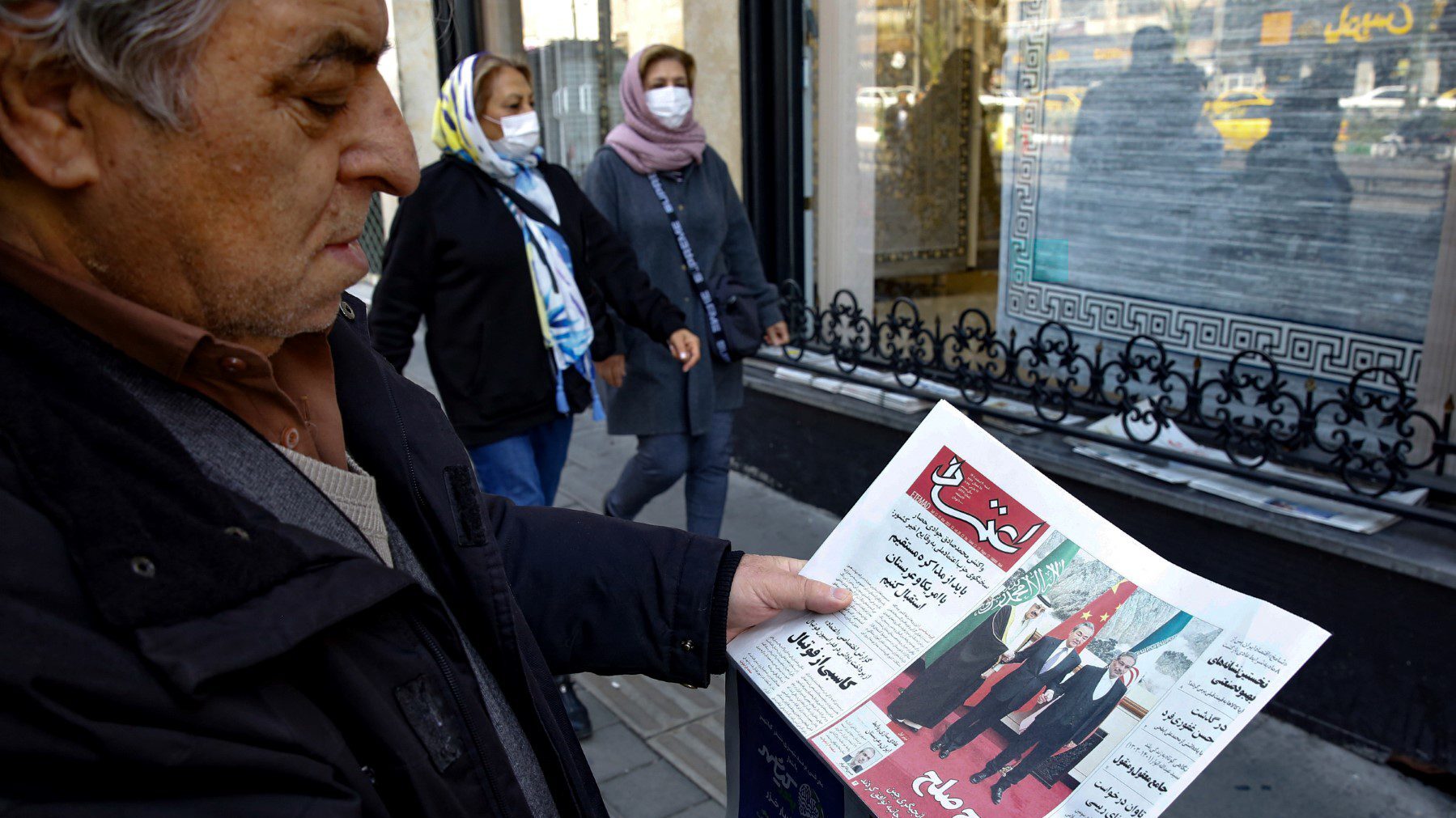
A man in Tehran holds a local newspaper reporting on its front page the China-brokered deal between Iran and Saudi Arabia to restore ties.
Photo: Atta Kenare/AFP
Bombshell news broke on Friday, March 10th, when China announced it had brokered an agreement between long-standing arch-rivals Saudi Arabia and Iran. After years of enmity, the two will resume diplomatic relations.
Even though its consequences are difficult to predict, the event is nothing short of seismic, marking a rearrangement of the balance of power in the Middle East.
In a joint statement, Tehran and Riyadh pledged to “re-open their embassies and missions within a period not exceeding two months,” while affirming their “respect for the sovereignty of states and the non-interference in internal affairs.”
Signed by Iran’s top security official, Ali Shamkhani, and Saudi Arabian national security adviser Musaed bin Mohammed Al-Aiban, the agreement committed to re-activate a 2001 security cooperation accord, as well as another earlier pact on trade, economy, and investment.
Fellow Gulf states (the United Arab Emirates, Oman, Qatar, Bahrain, and Kuwait) have welcomed the news, as did Iraq, Egypt, and Turkey.
Through the initiation of trade relations with the Saudis, Iran—a top U.S. adversary—would be able to blunt the pain of U.S. sanctions and frustrate its efforts to isolate it in the region. Saudi Arabia, for its part, also stands to benefit, as trade with Iran would be a boon to its own economic development, a primary focus.
Beijing’s initiative has not gone unnoticed by the U.S., which as a global hegemon, had held sway in the region for many decades.
The event is all the more remarkable since, historically, Beijing has had little to no interest in the region. While China has significantly increased its economic and political engagement with the Middle East in the past 15 years, it still was a relative newcomer and, wary of the U.S.’ presence, therefore tread cautiously when it came to its local politics.
Such trepidation is now a thing of the past, it would seem. Thus far, publicly, Washington has chosen to minimize Beijing’s latest power play—and therefore not to draw attention to the event’s true significance: China’s gaining of prominence in the Middle East at the expense of the U.S.
The reason for Iran’s having come to the negotiation table, believes White House National Security Council spokesman John Kirby, is the internal and external pressure that the government in Tehran was under.
“This is not about China,” the spokesman said, as he voiced his support for “any efforts to de-escalate tensions there and in the region,” as it was in the U.S.’ interest, and “something that we worked on through our own effective combination of deterrence and diplomacy.”
He went on to add that it was a positive development if it would help end the war in Yemen [where Iran-backed Houthi rebels, after having overthrown the Yemeni government, have been fighting a Saudi Arabia-led multinational coalition since 2015] while ensuring that Saudi Arabia no longer has to defend itself against attacks instigated by Iran.
As the two leading Shi’ite and Sunni Muslim powers in the Middle East, Iran and Saudi Arabia have backed opposite sides in proxy wars in Yemen, Syria, Lebanon, and Bahrain.
Whether normalization between Saudi Arabia and Iran will lead to the end of the still very active Yemen war remains an open question.
When asked by reporters about the deal, the U.S. president said that “better relations between Israel and their Arab neighbors are better for everybody,” but did not go into more detail.
For decades, Saudi Arabia has been the U.S.’ ‘gas station’ because of its vast oil reserves. Increasingly, the Saudis had started to pivot to the Asian market, supplying the Chinese in particular.
Since Saudi Crown Prince Mohamed bin Salman effectively took power in 2017, relations with Washington have cooled even further, reaching subzero temperatures under the Biden administration.
In addition, with Saudi Arabia and Iran’s normalization of relations, the path is now clear for them to join BRICS. Founded as a counterweight to institutions dominated by Western powers, the group of nations (Brazil, Russia, India, China, and South Africa) will this year decide whether to admit new members.
Should Iran and Saudi Arabia join the BRICS configuration, interesting possibilities could open up.
Together with BRIC member Russia, the two nations are among the world’s largest oil exporters, and as such, could leverage this fact (with China’s backing) to stop accepting petrodollars for their oil (U.S. dollars are used by any country to purchase oil from an oil-exporting country), and propose an alternative currency. That scenario could potentially affect the U.S. dollar.
In Beijing, where the deal between Tehran and Riyadh had been clinched, boasts about the accomplishment abounded.
“This is a victory for dialogue, a victory for peace, offering major good news at a time of much turbulence in the world,” Wang Yi, China’s top diplomat, said.
China will continue to play a constructive role in handling hotspot issues in the world and demonstrate its responsibility as a major nation, he added, noting that “the world is not just limited to the Ukraine issue.”
Reading between the lines, the statement casts China not only in the role of global power broker, a status the U.S. has long enjoyed, but is also a subtle stab at the hegemon; because of its exaggerated focus on the Russo-Ukrainian war, the U.S. conceivably had neglected the Middle East, leaving a power vacuum China is now only too happy to fill.
